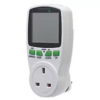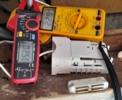- Joined
- 27 Jan 2008
- Messages
- 24,925
- Reaction score
- 2,882
- Location
- Llanfair Caereinion, Nr Welshpool
- Country

I was looking at the BBC web site with "Use an air fryer or microwave instead of an oven" advice, giving details of cost of cooking a baked potato.
5p in a microwave (800W for 10 minutes)
26p in an air fryer (1000W for 45 minutes)
£1.02 in an oven (2000W for 90 minutes)
They all work out as on all the time with a cost of around 28p per kWh, but an oven will not be on for 90 minutes, it will be one for around 15 minutes then it will cycle on/off, where the microwave will be using the 800 watt for the whole of the 10 minutes, and I know when I put in a pair of baked potatoes it takes a lot longer than 10 minutes, and in the main they are part of a meal, so also have a pizza which will go in the oven.
So the question is does pre-cooking the pair of potatoes in the microwave for 10 minutes, then transferring them to the oven to complete the cooking, together with the pizza use more or less energy to switching oven on earlier and baking only in the oven? As oven will be used for pizza.
I can easy measure power used in the microwave, it plugs in, so can use plug in energy meters, but the oven is hard wired, so hard to measure. Also the oven has 3 elements, top, side and back, with a 12 position selector knob to select if rear fan, top grill or side elements are used.
So to cook for example bacon, I can use the large bottom oven and grill closed door, or top oven and grill open door, bottom one easier as only turn bacon once, but which uses more energy?
As to other items, drying outside only works if the cloths can then be worn, if they need re-washing because of bird lime or soot, not so sure? OK first house I had a car port, ideal for drying cloths, but I live in an estate, where most homes have the option of using solid fuel, and we have thankfully loads of wild life, I love to sit looking out of the window and watching the red kites flying.
Even a simple thing like using a dish washer, told it uses less hot water than hand washing, so cheaper than hand washing, but the programs range for 58 minutes to nearly 3 hours, same with washing machine, both have so many options and very aware each wash uses one tablet, be it long or short wash, so one does not want to rewash, but one does want to wash for as little as possible. And every wash is different.
So things like switch to LED lights, not so sure either, I had moved to fluorescent years ago, why they compare with tungsten I don't know, seems daft, who uses tungsten? I am sure the compact fluorescent uses more power to a LED, but as a tube, not so sure, both around the 95 lumen per watt.
Take control of your central heating it says, I have around 16 thermostats in my home, two on the wall, 14 on the radiators, of them one wall thermostat is programmable, and 9 of the TRV's are programmable, but I would not think anyone today lives in a home with one thermostat, and few still use a programmer, most today have the programmer and thermostat combined. So rather pointless advice given.
Cost of appliances again pointless, not worth buying new freezer, or washing machine to get a more efficient model, and I question cost of boiling a kettle, my kettles, yes I use two, boil a measured amount of water each time used, yes the larger of the two has setting to leak back water so it uses more power to the one with fixed cup size, but can't see the amount of power is anywhere near that high. I have no second hand on my wrist watch, but it takes less than a minute to make two cups of coffee, 6000 watt / 60 is 100 so at 28p per kWh that's 2.8p for two cups of coffee for heating the water, 6.37p will cover over 4 cups of coffee.
Clearly the better insulated the home the less energy used, but I am just about to fit a new patio door, it is costing more than my fuel oil for two years, may safe energy, but will not save money, the turning down of the temperature in that room saved a lot more, door being changed as double glazing has blown, and it looks bad, and possible could leak, but room only used in the summer, so it will not help my bills.
5p in a microwave (800W for 10 minutes)
26p in an air fryer (1000W for 45 minutes)
£1.02 in an oven (2000W for 90 minutes)
They all work out as on all the time with a cost of around 28p per kWh, but an oven will not be on for 90 minutes, it will be one for around 15 minutes then it will cycle on/off, where the microwave will be using the 800 watt for the whole of the 10 minutes, and I know when I put in a pair of baked potatoes it takes a lot longer than 10 minutes, and in the main they are part of a meal, so also have a pizza which will go in the oven.
So the question is does pre-cooking the pair of potatoes in the microwave for 10 minutes, then transferring them to the oven to complete the cooking, together with the pizza use more or less energy to switching oven on earlier and baking only in the oven? As oven will be used for pizza.
I can easy measure power used in the microwave, it plugs in, so can use plug in energy meters, but the oven is hard wired, so hard to measure. Also the oven has 3 elements, top, side and back, with a 12 position selector knob to select if rear fan, top grill or side elements are used.
So to cook for example bacon, I can use the large bottom oven and grill closed door, or top oven and grill open door, bottom one easier as only turn bacon once, but which uses more energy?
As to other items, drying outside only works if the cloths can then be worn, if they need re-washing because of bird lime or soot, not so sure? OK first house I had a car port, ideal for drying cloths, but I live in an estate, where most homes have the option of using solid fuel, and we have thankfully loads of wild life, I love to sit looking out of the window and watching the red kites flying.
Even a simple thing like using a dish washer, told it uses less hot water than hand washing, so cheaper than hand washing, but the programs range for 58 minutes to nearly 3 hours, same with washing machine, both have so many options and very aware each wash uses one tablet, be it long or short wash, so one does not want to rewash, but one does want to wash for as little as possible. And every wash is different.
So things like switch to LED lights, not so sure either, I had moved to fluorescent years ago, why they compare with tungsten I don't know, seems daft, who uses tungsten? I am sure the compact fluorescent uses more power to a LED, but as a tube, not so sure, both around the 95 lumen per watt.
Take control of your central heating it says, I have around 16 thermostats in my home, two on the wall, 14 on the radiators, of them one wall thermostat is programmable, and 9 of the TRV's are programmable, but I would not think anyone today lives in a home with one thermostat, and few still use a programmer, most today have the programmer and thermostat combined. So rather pointless advice given.
Cost of appliances again pointless, not worth buying new freezer, or washing machine to get a more efficient model, and I question cost of boiling a kettle, my kettles, yes I use two, boil a measured amount of water each time used, yes the larger of the two has setting to leak back water so it uses more power to the one with fixed cup size, but can't see the amount of power is anywhere near that high. I have no second hand on my wrist watch, but it takes less than a minute to make two cups of coffee, 6000 watt / 60 is 100 so at 28p per kWh that's 2.8p for two cups of coffee for heating the water, 6.37p will cover over 4 cups of coffee.
Clearly the better insulated the home the less energy used, but I am just about to fit a new patio door, it is costing more than my fuel oil for two years, may safe energy, but will not save money, the turning down of the temperature in that room saved a lot more, door being changed as double glazing has blown, and it looks bad, and possible could leak, but room only used in the summer, so it will not help my bills.


